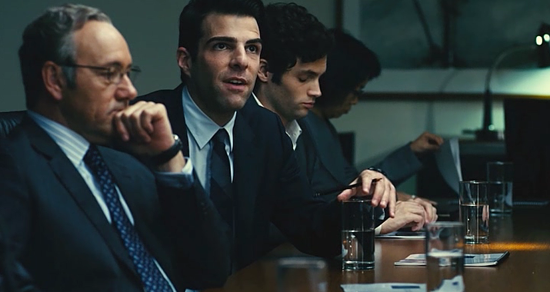
“You know damn well that you don’t sell anything to anybody unless you know people will come back for more” – words from the movie that perhaps resonates the quality of this film, and yes, Margin Call’s boardroom drama is a seller. Inspired by the US financial and economic collapse of 2008, the film’s writer and director J.C Chandor gives us business uproar at its best as he captures a problematic moment in a large investment bank and puts the spotlight on the people who didn’t know what hit them until it was too late.
Margin Call boasts an ensemble cast of characters that included Kevin Spacey (21, American Beauty), Paul Bettany (The Da Vinci Code, Priest), Jeremy Irons (Die Hard: With A Vengeance), Demi Moore and Stanley Tucci, and all of them are in for a very long night. The movie kicks off with most of the firm’s risk department employees being sent home for good, including Eric Dale (Tucci), the boss of risk analysts Peter Sullivan (Zachary Quinto) and Seth Bregman (Penn Badgley), who was in the middle of working on “something big” when the doors closed in on him. He then passes on his work to Sullivan who completes it and later discovers that the firm faces a Goliath of a problem. And with that, the firm calls in the big players which turned the movie into an uptight “my boss talking to his boss, and then talks to their bosses whose bosses they should call” trend (yes, it’s a large company filled with bosses).

Okay, so let’s go to the interesting point of the movie. Margin Call illustrates the plight of companies and firms whereby lack of vigilance over minor details screws the major picture and eventually leads to an unfortunate “crash and burn” situation. Try imagining 100 people in a small boat in the middle of the ocean. Because they did not pay attention to the size of the boat and kept going for it, they are now facing a crisis – that is, either to cut off the population by getting rid of other people so the boat floats, or make everyone stay until the boat sinks with all of them. Margin Call puts us in a position to observe the reality that can hit corporate salesmen – an angry storm and the people who found no shelter against it. It’s the silence before the big drop, and with less than 108 minutes to show it, the drama was a success.
The best thing about Margin Call is that, given the complexity of the business crisis the firm had to face, J.C Chandor did us a favor by pointing the camera not on the paper-works or computer screens that technically project the problem, but on the awe-ridden faces and conversations of the characters where the audience can effectively see what the big deal was all about. That is to say, having to just listen and look at the characters to be able to relate to the movie is way better than to go through a lot of technical terms most of us don’t even understand.
J.C Chandor also knows that Margin Call didn’t have a great cast for nothing. Kevin Spacey may have stood above a little bit over the rest but the fact that the acting is something no one can joke about is another great feat of the film. It’s as if there were no actors, only real corporate folks trying to solve their dilemma with a movie camera recording it. The acting is exceptionally realistic. The great depth written all over this movie is a treat no one can ignore, that’s why it is, or should be, a big hit. Wall Street drama? Do it Chandor’s way – no effects, just solid and convincing facial expressions, engaging dialogues (good script), and the profanity for the word “fuck” (that’s right, it came a lot in this movie), which makes things a lot more realistic (let’s face it).
Being the great movie that it is, Margin Call gives us a front door view on how money makes the world go round for a western capitalist society and what money can do at the heart of the life of everyone working to earn it.
Comments